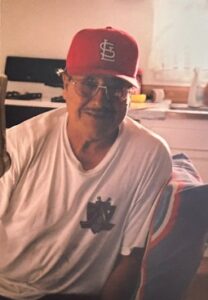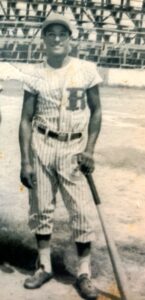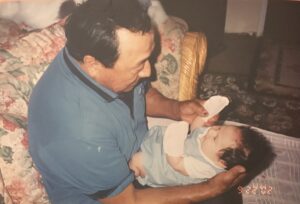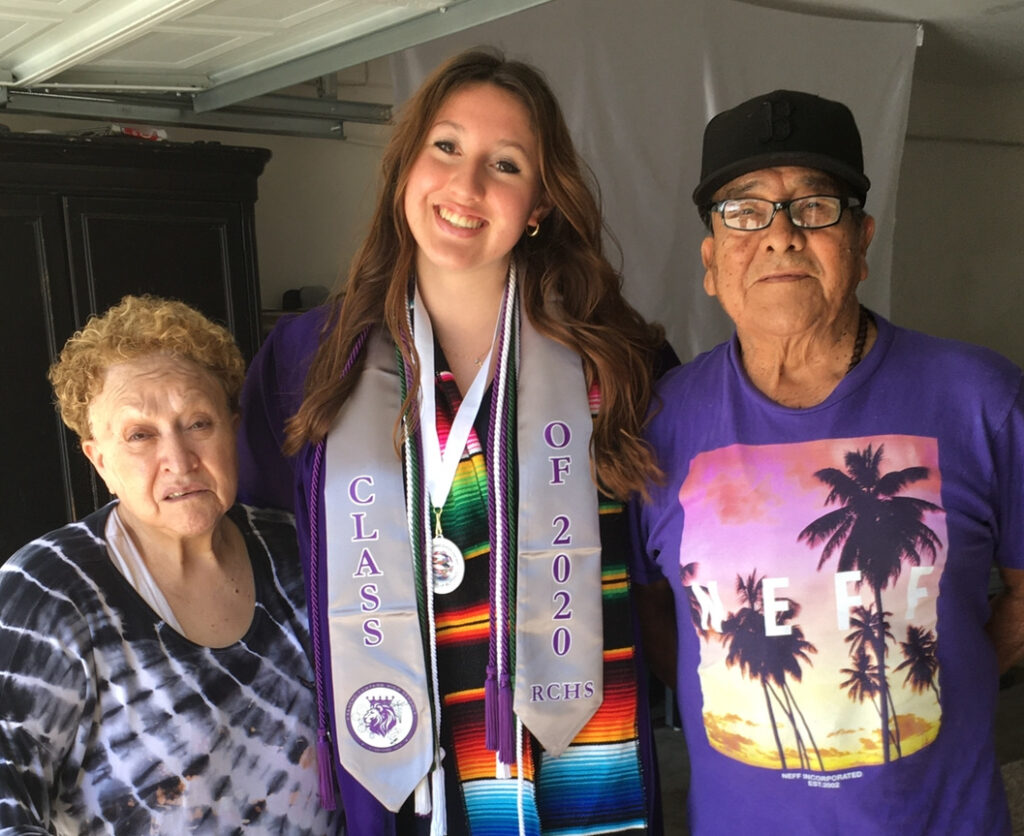(OXNARD, Calif.) — I have spent my whole life chasing stories, but no words could stop the one that mattered most from slipping away. As the days passed, the man who once carried our family’s history with humor and pride held onto fewer and fewer pieces of it.
Tomás Avila — my grandfather — was 84 when he passed away on February 8, 2025, just a day after I interviewed him for this story. He was a storyteller, a singer, a devout Catholic, and a proud Mexican immigrant who left everything he knew to build a better life in California.

Tomás Avila was a storyteller, a singer, a devout Catholic, and a proud Mexican immigrant who left everything he knew to build a better life in California. (Credit: Valeria Garcia)
Dementia chipped away at his memory, taking his sharp wit, his recall of baseball games, and his long conversations about Mexico.
But it didn’t take him.
Even when he forgot the year or how old he was, he never forgot to reach for my hand. He never forgot the songs he loved. He never forgot how much he adored his children.
And he never forgot his prayers.
“Tiempos lindos”: Mining and baseball
Before the disease blurred the details, my grandfather was known for his stories. He worked as a miner in Durango, Mexico, in the 1960s, waking before dawn for grueling shifts at a mine called Coyote.
Mining had long been the backbone of Durango’s economy, with its mountains rich in silver and other minerals. It was dangerous, punishing work, but my grandfather rarely spoke of the hardship. He talked instead about the camaraderie, the dignity of labor, the pride in earning his way.
“Todos fueron felices. Tiempos lindos,” he said recalling his greatest day.
[“They were all happy. Beautiful times.”]
But the real love of his youth wasn’t in the mines. It was on the baseball field.

Tomás Avila in uniform for Sección 11. (Credit: Valeria Garcia)
Durango wasn’t like other parts of Mexico, where soccer reigned. Here, baseball had a hold — brought back by workers who had spent time in the U.S. and returned with the game. It had taken root; by the time my grandfather came of age, it was a way of life.
He played for a local team, Sección 11, one of the region’s most well-known baseball clubs. He was good. He played fast and smart, as a centerfielder with quick reflexes and a sharp mind for the game.
“Me querían mucho,” he told me. “They loved me.”
Of course, they did — a centerfielder with a command for the game and charm like a movie star. How could they not? A small smirk crept on his face as he recalled.
But he left it all behind. He didn’t do it for himself. He did it for his children.
“Abuelo, tell me about Mexico”
He came to the U.S. alone, without fear, settling in Oxnard, Calif. He worked, he built a family, and he held onto his traditions. He never let go of Spanish, never tried to be anything but who he was — a man who still sang rancheras and corridos, who still prayed in the language he had spoken since childhood.
Though he knew very little English, it didn’t stop him from talking to everyone. He’d chat up the bakers, neighbors, my baby cousins — sometimes in full paragraphs — confident they understood him.
In his final years, when his mind started to drift, the music remained. Sometimes he’d hum a tune neither of us could fully name. Other times, his voice, thin but steady, would break through with the words to “Alejandra”, a Pedro Infante song from 1959. When he sang, it was like nothing had changed.
Trying to interview him was like reaching into a fog — sometimes, he was there, clear and sharp. Other times, he’d get lost halfway through a story, searching for a thought that had slipped just out of reach.
“Abuelo, cuénteme de México,” I asked him. [“Grandpa, tell me about Mexico.”]
Though he couldn’t remember the exact year he left, he remembered baseball. He remembered the field behind his school in Tlahualilo. He remembered the games played between young men and older ones.
“Todos los días nos íbamos a jugar béisbol.” [“Every day, we would go play baseball.”]
And then he stopped and went quiet.
“Y luego, ya llegó el tiempo que me vine para acá. Con la ilusión sobre la vida.” [“Then the time came for me to leave. With the illusion of life.”]
He missed the plains. He missed the fields. But he never regretted coming.
What he did regret — what lingered on his mind even as everything else faded — was the family he had lost.
“Estoy orgulloso”: Family lost, family remaining
He would ask about people who had been gone for years. His brothers. His parents. His voice would lift with hope, and I would have to tell him, again, that they weren’t here anymore.
It would happen in loops. The same question, the same answer. Each time, I could see him processing it like it was new. But when he talked about his children, his voice never wavered.
“Estoy orgulloso,” he said. [“I’m proud.”]
He named his eldest daughter — my aunt Maria who passed away nearly a decade ago — his voice swelling. As he recalled her career accomplishments, his eyes bright in a way that no disease could take from him.
Even when words failed him, even when time erased names and dates, his love for his children was the one thing that stayed.
Faith was the other.
“Dios es bueno”: Faith is personal
Every morning, he sat in his quaint room, whispering prayers, running his fingers over a rosary that never left his side.
“Dios es bueno,” he murmured. [“God is good.”]
“Yo los bendigo que yo ante Dios, ante la Santisima Virgen le digo gracias. Señor aquí estoy, estoy contando algo de tu historia que tu ya sabes.” [“I bless you before God. And before the Blessed Virgin Mary, I thank her. Lord, here I am, telling something about your story that you already know.”]

As a little girl, my grandpa used to bring me fresh bread from the panadería, hide Easter eggs for me on his front lawn, and sing for baby Jesus every Christmas. (Credit: Valeria garcia – photo taken Sept. 2002)
“Dios te bendiga,” he said. [“God bless you.”]
And I told him, “He is always with you.”
As a little girl, my grandpa used to bring me fresh bread from the panadería, hide Easter eggs for me on his front lawn, and sing for baby Jesus every Christmas.
“He would give everything for us,” my mother Veronica said. “He would work two jobs for us to be able to eat or just to be able to go on field trips with the rest of our classmates.”
Tomás lived in his beloved garden. He felt free around nature. My grandfather would care for his plants as though they were his children, and as he grew older spending time under the sun became his safe haven. And sometimes, he would sing to his plants.
Every time I visited my grandpa he always sent me home with a blessing. Now, he too is home. What time took from him, I will keep. His stories. His voice. His love.
I am a journalist, and my greatest story slipped away before I could finish telling it.
Authors Note: Four months later in June 2025, my grandmother, Maria Lucila Avila, joined him in eternal rest — together again, just as they had always been in life.
Los quiero con toda mi alma.


